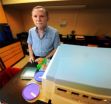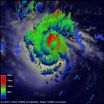(Press-News.org) AUGUSTA, Ga. – When stressed, about 30 percent of blacks hold onto too much sodium, the equivalent of eating a small order of fast food French fries or a small bag of potato chips, researchers say.
"This response pattern puts you under a greater blood pressure load over the course of the day and probably throughout the night as well, increasing your risk of cardiovascular disease," said Dr. Gregory Harshfield, hypertension researcher at the Institute of Public and Preventive Health at Georgia Health Sciences University.
In response to stress, they hold onto about 160 milligrams of salt, and the top number of their blood pressure – indicating the pressure inside blood vessels each time the heart beats - goes up about seven points more than normal and stays elevated about an hour longer, said Harshfield, who is presenting his findings Sept. 7 during the Behavioural Economics, Hypertension Session of the Psychogenic Cardiovascular Disease Conference in Prato, Italy.
Over the course of the day, this response adds a daily sodium load of about 500 milligrams on top of typically salt-heavy diets. The Institute of Medicine recommends a daily sodium intake of less than 2,300 milligrams – preferably under 1,500 milligrams – while average consumption is about 3,700.
"Everybody knows stress is bad for you and everybody has the perception that a high-salt diet is bad for you, and both are particularly bad for these individuals," said Harshfield who is trying to find an easy way to identify them. "Every time they are stressed, they hold onto as much salt as you get eating a small order of French fries and this can occur many times over the course of even a good day."
The worse news is this increased retention likely causes blood pressures to stay elevated even during sleep, which should be a recuperative time for the body, Harshfield said. Nighttime blood pressures often are considered the truest reading since they should not be impacted by stress.
In a handful of young blacks identified as sodium retainers through a complex research protocol, Harshfield has shown that the dangerous sodium load can be lifted with angiotensin receptor blockers, a common blood pressure treatment. Ironically these drugs are rarely used in blacks who tend not to have high levels of the powerful blood vessel constrictor angiotensin. However, Harshfield's group has evidence that sodium retainers would definitely benefit because they have a version of the angiotensin receptor gene that exacerbates problems with sodium handling. A truly low-salt diet likely would be beneficial as well.
Angiotensin increases blood pressure by directing the kidneys to hold onto more salt and by increasing levels of the hormone aldosterone, which also directs the kidneys to retain salt. The normal response to stress is to temporarily increase blood vessel constriction, which actually increases sodium excretion, Harshfield said.
His studies have long focused on the kidney and years ago found that about 30 percent of blacks and about 10 percent of whites tend to hold onto more sodium for longer periods in response to stress. Stress activates the sympathetic nervous system, which drives the – hopefully temporary – increase in blood pressure.
The latest findings come from a $10.6 million Program Project grant from the National Heart, Lung and Blood Institute focused on how the body regulates blood pressure in response to stress. Part of that grant includes a study in which half of 140 young adult sodium retainers take an angiotensin receptor blocker for about a week while the remainder take a placebo. Harshfield "un-blinded" a small number of study participants to collect data for a grant renewal proposal.
In the ongoing search for an easy way to identify sodium retainers, Evan Mulloy, a first-year student at the Medical College of Georgia, is working with Harshfield to collect urine samples from 7- to 21-year-old GHS Children's Medical Center patients being seen for hypertension. Using the doctor's visit as the stressor, they are looking at sodium levels in the urine before and after a visit. Harshfield also is working with MCG Molecular Geneticist Haidong Zhu to develop a genetic profile that could be used for screening.
One in three Americans is hypertensive, according to the NHLBI. The majority of sodium consumed is from processed and restaurant foods.
INFORMATION:
Stress prompts some to retain as much salt as eating fries
2012-09-07
ELSE PRESS RELEASES FROM THIS DATE:
Who's the most influential in a social graph?
2012-09-07
At an airport, many people are essential for planes to take off. Gate staffs, refueling crews, flight attendants and pilots are in constant communication with each other as they perform required tasks. But it's the air traffic controller who talks with every plane, coordinating departures and runways. Communication must run through her in order for an airport to run smoothly and safely.
In computational terms, the air traffic controller is the "betweenness centrality," the most connected person in the system. In this example, finding the key influencer is easy because ...
Next generation of advanced climate models needed, says new report
2012-09-07
WASHINGTON — The nation's collection of climate models should advance substantially to deliver more detailed, smaller scale climate projections, says a new report from the National Research Council. To meet this need, the report calls for these assorted climate models to take a more integrated path and use a common software infrastructure while adding regional detail, new simulation capabilities, and new approaches for collaborating with their user community.
From farmers deciding which crops to plant next season, to mayors preparing for possible heat waves, to insurance ...
Experts recommend screening adults for hypertriglyceridemia every five years
2012-09-07
Chevy Chase, MD—The Endocrine Society today issued a Clinical Practice Guideline (CPG) for the diagnosis and treatment of hypertriglyceridemia. Triglycerides are a type of fat found in the blood and are associated with cardiovascular risk. The CPG, entitled "Evaluation and Treatment of Hypertriglyceridemia: An Endocrine Society Clinical Practice Guideline" appears in the September 2012 issue of the Journal of Clinical Endocrinology and Metabolism (JCEM), a publication of The Endocrine Society.
The most common reasons for high triglycerides include being overweight, lack ...
Analysis finds benefits to racial quotas in Brazilian higher education
2012-09-07
A racial quota system at one of the leading universities in Brazil raised the proportion of black students from low-income families, without decreasing their efforts to succeed in school, a major new study finds.
"Critics of affirmative action policies often argue that making it easier for people to get into college lowers their incentive to try hard academically. That argument doesn't stand up to our data," says Andrew Francis, an economist at Emory University and co-author of the study.
Francis conducted the research with Maria Tannuri-Pianto, an economist at the ...
Northwestern researchers set world record for highest surface area material
2012-09-07
Northwestern University researchers have broken a world record by creating two new synthetic materials with the greatest amount of surface areas reported to date.
Named NU-109 and NU-110, the materials belong to a class of crystalline nanostructure known as metal-organic frameworks (MOFs) that are promising vessels for natural gas storage for vehicles, catalysts, and other sustainable materials chemistry.
The materials' promise lies in their vast internal surface area. If the internal surface area of one NU-110 crystal the size of a grain of salt could be unfolded, ...
Novel surgery removes rare tumor, rebuilds face and jaw
2012-09-07
DETROIT – Using a novel surgical approach, it's possible to rebuild a functional lower jaw and mouth, and preserve a patient's ability to eat and speak after removing an invasive facial tumor, according to a new report from Henry Ford Hospital in Detroit.
This case study not only documents a successful surgical technique to create a fully functional lower jaw, but also reports the rare occurrence of a bone cancer (osteosarcoma) that spread from the patient's right femur to his jaw bone.
Most commonly, osteosarcoma is found in the long bones of the leg and does not ...
Study finds how BPA affects gene expression, anxiety; Soy mitigates effects
2012-09-07
New research led by researchers at North Carolina State University shows that exposure to the chemical bisphenol A (BPA) early in life results in high levels of anxiety by causing significant gene expression changes in a specific region of the brain called the amygdala. The researchers also found that a soy-rich diet can mitigate these effects.
"We knew that BPA could cause anxiety in a variety of species, and wanted to begin to understand why and how that happens," says Dr. Heather Patisaul, an associate professor of biology at NC State and lead author of a paper describing ...
University of Alberta medical scientists first in the world to look at structure of vital molecule
2012-09-07
Molybdenum is an essential metal required in all living beings from bacteria to plants to humans. But as vital as this metal is, no one understood the importance of its structure until the Faculty of Medicine & Dentistry's Joel Weiner and his team jumped on the case.
Molybdenum plays critical roles in human health. It does not act alone but is found attached to certain proteins, called molybdenum enzymes, by a very large organic molecule. The organic molecule that holds the molybdenum in place in a protein is extraordinarily complex. and "expensive" for the cell to make, ...
People who get kidney stones more likely to develop kidney failure: U of A medical research
2012-09-07
People who have had kidney stones are twice as likely to need dialysis or a kidney transplant later in life, demonstrates recently published findings by medical researchers at the University of Alberta. Their article was recently published in the British Medical Journal.
Faculty of Medicine & Dentistry researchers Todd Alexander and Marcello Tonelli tracked data of more than three million Albertans over an 11-year period from 1997 to 2009. They discovered those with a history of kidney stones were twice as likely to have serious kidney problems later in life when compared ...
NASA saw Michael become an Atlantic hurricane, wind speed more than doubled
2012-09-07
The Atlantic Ocean hurricane season spawned two hurricanes this week and NASA satellites have been monitoring them and providing valuable data to forecasters. NASA's TRMM satellite saw very heavy rainfall and powerful towering thunderstorms in Michael when the storm became a hurricane. Michael's wind speeds more than doubled in 24 hours and it is now a major hurricane on the Saffir-Simpson scale.
Tropical Storm Michael became a hurricane on Sept. 5 and NASA's Tropical Rainfall Measuring Mission (TRMM) satellite passed by and collected data on rainfall and cloud heights. ...


